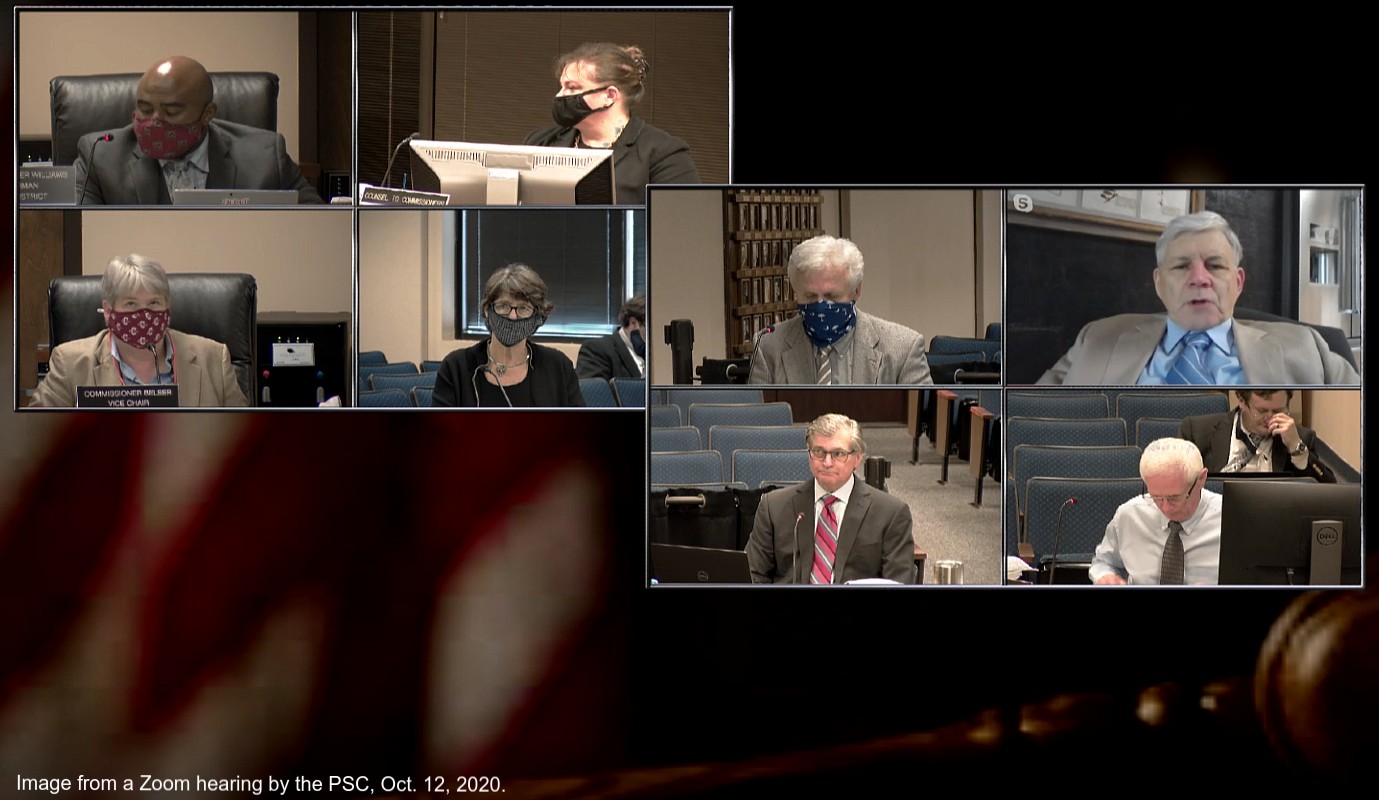
By Rodney Welch, special to Statehouse Report | The S.C. Public Service Commission (PSC) on Wednesday sent Dominion Energy back to the drawing board in what is being interpreted as a new spirit of oversight..
 Under the 2019-passed Energy Freedom Act, the state’s electric utilities were required to make a three-year Integrated Resource Plan (IRP) for managing future growth and to explore adopting sources of renewable energy and solar expansion.
Under the 2019-passed Energy Freedom Act, the state’s electric utilities were required to make a three-year Integrated Resource Plan (IRP) for managing future growth and to explore adopting sources of renewable energy and solar expansion.
The PSC, whose seven members have been appointed in the last two years, unanimously rejected the plan. The motion, made by PSC Chairman Justin Williams of Columbia, requires the utility to make significant modifications to its draft plan, remodel the cost of its proposed plans, and expand the availability of solar and renewable energy, among other things.
For at least one environmentalist, the order was a bold move for a new PSC.
“This shows that we have a Dominion that’s doing things the same old status-quo way that they’ve been doing for the last decade,” said John Tynan of Conservation Voters of South Carolina, “and we have a new Public Service Commission that’s not OK with the status quo.”
A setback for the utility
For the utility, the PSC decision was a setback they promised to overcome.
“Dominion Energy diligently strived to satisfy all requirements set forth in the new law and to address other parties’ comments during this proceeding in order to provide the most cost-effective, safe and reliable path to a sustainable energy future for our customers,” said spokesperson Rhonda O’Banion. “We will thoroughly review the Public Service Commission’s final order on the IRP and make necessary revisions in a timely manner. We remain committed to providing our customers with the safe, reliable service they count on us for every day.”
The Dominion plan’s lack of renewable energy sources was the focus of a three-day PSC hearing in mid-October. The intricate aspects and issues of Dominion’s proposed IRP were thoroughly hashed out between utility officials and attorneys for several environmental groups.
 In the IRP’s opening summary, Dominion claimed to be receptive to expanding clean energy. The utility “intends to utilize more power generated from clean energy sources,” the summary read. The plan also reflected Dominion’s commitment “to clean energy in the energy efficiency programs offered to customers and in the probable modifications to the Company’s electric transmission and distribution grid which will facilitate the growth of clean energy solutions while assuring that energy continues to be provided in a safe, reliable, and affordable manner.”
In the IRP’s opening summary, Dominion claimed to be receptive to expanding clean energy. The utility “intends to utilize more power generated from clean energy sources,” the summary read. The plan also reflected Dominion’s commitment “to clean energy in the energy efficiency programs offered to customers and in the probable modifications to the Company’s electric transmission and distribution grid which will facilitate the growth of clean energy solutions while assuring that energy continues to be provided in a safe, reliable, and affordable manner.”
Following the direction of the Energy Freedom Act, also known as Act 62, Dominion drafted eight different plans. Each alternative used six energy resources which Dominion engineer James Neely testified represented a “reasonable range of fuel types or technologies currently available for providing additional generation.” The plan that the company eventually chose was determined to be the most cost-efficient, it said. But, as Neely conceded during testimony, the company did not consider adding renewable energy before 2026, which sources said may have doomed the filing before the PSC on Wednesday.
Also, as became clear during testimony, the IRP did not promise much. While state law requires a plan, that doesn’t mean an “action plan.” As Dominion’s Economic Resource Commitment Manager Eric Bell noted, that would imply that the IRP “is the driving document behind actually executing the plans that are proposed.”
Dominion’s proposed IRP, he later testified, “actually doesn’t propose any changes for that three-year time frame.”
Instead, he spoke vaguely of the IRP as a “snapshot” that simply shows where Dominion is at a given time.
“A do-nothing” plan”

PSC Commissioner Tom Ervin of Greenville grew frustrated during the October hearing when talk turned to updating the IRP.
“You’re already staring at a potential update of a plan that really is not a plan,” he said. “How can you update something that’s really not in place yet?”
“Dominion is essentially asking this commission to approve a `do-nothing’ plan” Sierra Club attorney Dorothy Jaffe said during the hearing, which has “virtually no clean energy for the next two decades and continues to over-rely on fossil fuels without having performed a retirement analysis to justify this decision.”
Kate Mixson, a staff attorney with the Southern Environmental Law Center working with the S.C. Coastal Conservation League and the Southern Alliance for Clean Energy, said the problem with Dominion’s proposed IRP was that it didn’t closely follow the state’s new Energy Freedom Act (EFA)
“They have to fairly evaluate a full range of resources available to them,” she said, “and we think the EFA is very explicit that that includes demand side resources like energy efficiency, that it includes solar, that it includes battery storage. And we don’t think that the Dominion IRP, as it was filed, fairly evaluated those resources.”
![]() But while opponents doubted the utility’s sincerity, there was also testimony indicating the company had made a good-faith effort.
But while opponents doubted the utility’s sincerity, there was also testimony indicating the company had made a good-faith effort.
Philip Hayet, an engineer with the Georgia engineering firm of J. Kennedy and Associates who spoke on behalf of the S.C. Office of Regulatory Staff, testified to the PSC that he found Dominion’s original plan problematic, but said the utility had since corrected previous errors and accepted other suggestions.
“The company addressed all of the 39 items that we identified, in one way or another,” he said. “Of the 19 items we recommended that should be addressed immediately, the company considered and addressed all but one in its updated IRP analysis.”
Just prior to the vote, PSC commissioner Carolyn “Carolee” Williams of Charleston thanked Dominion for its cooperation throughout a very long process.
The goal “is to produce the most reasonable and prudent IRP going forward,” she said. “But I wanted to note that that’s going to be true year after year, and each year refinements are going to be made in the IRP that will make it a better visionary and a more reliable planning tool.”
Rodney Welch is a freelance reporter who lives in Elgin, S.C. Have a comment? Send to: feedback@statehousereport.com.
















 We Can Do Better, South Carolina!
We Can Do Better, South Carolina!
Pingback: Charleston Currents – NEWS BRIEFS: RiverDogs have a new Major League partner